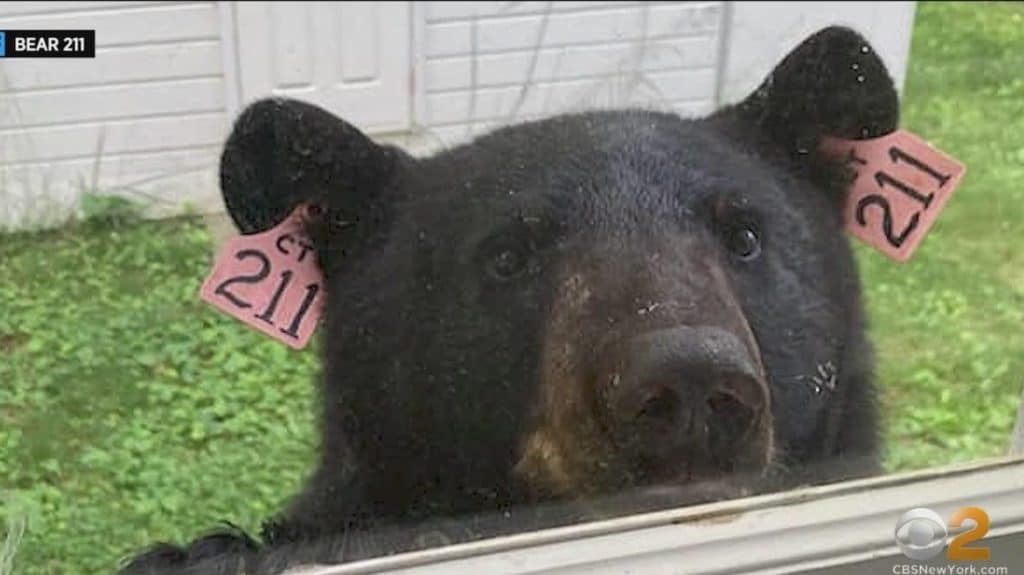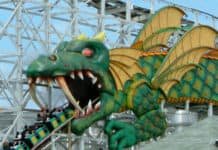
A black bear that roamed the backyards of homes in Connecticut and Northeast Westchester was hit by a car on July 26, and had to be put down. The bear was known as Bear 211 for the tags that were placed on his ears by the Connecticut Department of Energy and Environmental Conservation.
Bear 211 became a national sensation when a Facebook page was set up and thousands of followers enjoyed photos from homeowners in and around Armonk, who posted about the 125-pound black bear.
The auto accident occurred near Easton, Connecticut, but the vehicle left the scene. After the accident, Bear 211 was seen with serious injuries and had to be euthanized.
News of Bear 211’s death hit many Westchester residents hard, including many of the 5,000 followers of the Bear 211 Facebook page. “My heart is broken right now to the point where I can’t stop the tears. I am in the middle of making a Bear 211 album, (which I will continue), because of the joy he has brought me, and so many others. Never has a wild/forest animal been loved so much in this area. There is the blessing, Bear 211 is loved. I am tying to focus on that and the unity he gave us within his FB page. I am happy we have wonderful memories of Bear 211. Rest in Peace, Bear 211. We love you,” was one post.
Another post-“This bear brought so much happiness and was often the topic of conversation at the dinner table with our children.. (they actually put their phones down). Thank you again Bear 211 for bringing light to many people who needed it.”
Bear 211 seemed unafraid of people and was found in backyard polls, playgrounds, on deck furniture.
The environmental conservation group, Wildlife in Crisis Inc, gives us knowledge with it post.
“A tribute to a much loved bear: He was known as Bear 211 due to the unsightly plastic tags pierced through his beautiful ears. He had a Facebook page. He was beloved by residents of Westport, Weston and surrounding towns. He swam in pools, he sat on porches, he lingered on lawns and he roamed. He weighed 120 pounds, a yearling bear. He touched the hearts of many during his short time on this earth. On July 26th, this majestic bear was critically injured after being hit by a car and local police officers ended his suffering.
“We are heartbroken at Wildlife in Crisis. We’ve raised orphaned bear cubs and know first-hand just how endearing this species can be. We are proud of our community for their compassion for this bear. There is much we can learn from Bear 211. As suburban sprawl has overtaken Fairfield County, we are now more than ever stewards of the wild animals that live amongst us. We can all make a difference for wildlife from bears to butterflies, by being good stewards. Enlighten your neighbors. Leave mature trees standing. Don’t use pesticides, rodenticides or herbicides, and work towards banning them. Allow half your lawn to grow into a life giving meadow. Don’t trap wildlife, leave them be. Keep cats indoors and supervise your dogs. It’s really easy and so fulfilling to live in harmony with nature. We must teach our children to be tolerant and respectful of our ecosystem. Incessant development killed this bear and so many other wild animals.
“Lack of foresight has caused the overdevelopment of our towns. Traffic is out of control. There’s no time for bureaucracy, there is no time for procedures, the time is now to preserve what little is left of open space. All privately owned land will be lost to development unless it is permanently protected. The most meaningful thing we can do as a community to honor Bear 211’s memory is to actively preserve remaining open space.
“Black bears are omnivores, with a preference for succulents, greens, roots, nuts, seeds and berries. They will prey on fish and occasionally newborn fawns in the spring, bringing natural balance to our ecosystem. They vary in color from white to brown to black. Mating season is in May and June with delayed embryo implantation happening in the fall once female bears have sufficient fat reserves. They only breed every other year, and only if they are fit enough to raise young. One to five cubs are born in the mother’s winter den and remain with her for 18 months.
“A bear habituated to humans will eventually be killed. Black bears will almost always retreat from humans. If they are nervous they will sometimes bluff charge-pounce once, slam their front feet down, blow loudly, and sometimes smack their lips. Blustery bears are not about to attack, they are simply showing their discomfort around humans before they retreat or tree. Keep your distance from bears and they will do the same. Don’t run from a bear, simply walk away. Bears are easily scared by clapping, yelling and a water hose if necessary. Just use common sense. Keep bird feeders far from your house. Supervise your dogs! Keep garbage in bear proof containers or closed securely in your garage. A little ammonia in a garbage can will mask food odors. Bears have an incredible sense of smell and are now bulking up for winter. They are not true hibernators, they will emerge from dens on warmer winter days, especially if they are on the thin side. Let’s appreciate these magnificent creatures by respecting their space and keeping remaining trees standing, especially old growth trees that produce vital life giving mast. Much appreciated donations in Bear 211’s memory can be made on our website: www.wildlifeincrisis.org.”
I’m sure there are some homeowners in Armonk that were not thrilled by a visit from Bear 211, for the safety of their young children. But most enjoyed the reprieve from the reality of the pandemic and for the moment that it brought joy to our lives.
“We fell in love with his beautiful face and soulful eyes. We loved watching the joyful antics of a juvenile bear with no cares in the world. As he cemented a place in our hearts he was unknowingly cementing his fate. We can’t lose sight of what he did for all of us. He was the common denominator that brought us all together and we all fell in love with him. “
“211 gave us a temporary reprieve from all the divisiveness that fills the rest of our world every day. There are so many posts on this page that many of us missed important information about how and when he lost his fear of humans. We can blame the birdfeeders, the garbage, the grills left in our yards but he started at a very young age when he was hand fed at a homeless encampment in Waterbury. He was relocated to Naugatuck after that but clearly not far enough”
One homeowner enjoyed the visit. “You could tell he just wanted to cool off, was a little tired and probably a little hungry,” says Stein. “But it was nice and definitely gratifying to know that he had a fun filled afternoon with us…In hindsight I’m really thankful that I did get to spend some time with him.”





